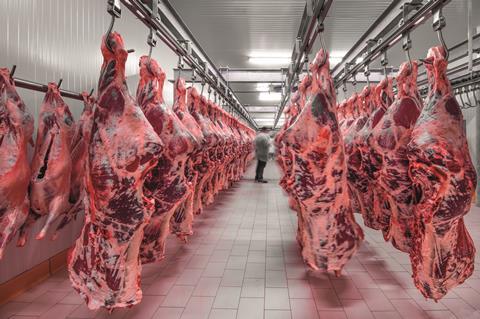Meat industry trade bodies have warned of the potentially “serious impact” on food producers if current discounts on official controls (OC) in abattoirs and meat businesses are dropped.

The Food Standards Agency (FSA) has issued a call to evidence in relation to its charging structure for official controls (OC) in abattoirs, where Official Veterinarians and Meat Hygiene Inspectors inspect every animal and carcase to ensure regulations are complied with and that the meat is fit for human consumption. Charges are currently discounted according to the number of hours involved so that smaller abattoir businesses, which require fewer hours regulation, receive a greater discount.
According to the FSA, the aim of the call for evidence is to “identify if and how discounts applied to charges for OC and OOA for businesses in the meat sector provide benefits to businesses and consumers, and value for money for Government.”
It said: “Evidence submitted in response to this call will be used to advise Ministers on the appropriate balance of charges and discounts at the strategic level. It will also help the FSA to understand consumers’ and other interested parties’ perceptions of the effects of the discount.”
The FSA added that it will also “provide greater insight into the administration required by those involved in the operation and application of discounts.”
Removing the discount poses “serious challenge”
The Rare Breeds Survival Trust (RBST) has warned that increasing FSA charges for small abattoirs would create “a major new challenge” in the ongoing collaborative effort to reverse the decline of the network. RBST chief executive Christopher Price said: “It is crucial that smaller abattoirs continue to receive this discount on the cost of FSA regulation.
“A robust and resilient local abattoir network, capable of processing small numbers of different species and breeds, is vital for the sustainable livestock sector, particularly those farmers and smallholders keeping native breeds.
“Reducing or removing the discount would put even greater pressure on already struggling businesses, posing a serious challenge to ongoing efforts to reverse the decline in the small abattoir network and having a serious impact on farmers and food producers more generally who would inevitably see a consequential increase in their costs.
“There are of course also the animal welfare implications of longer journey times if farmers have to take their animals to more distant abattoirs.”
Price added: “Over the past year the collaborative effort to reverse the decline of small abattoirs has been strongly supported through Government policies such as the Small Abattoir Fund, and we urge the new Defra Ministerial team to ensure that the important progress being made is not decimated by an increase in FSA charges.”
Industry stakeholders “must make their voices heard”
Head of external affairs for the Association of Indepedent Meat Suppliers (AIMS), Dr Jason Aldiss, has expressed his concern: “We must be clear: if the FSA removes the current discount structure without addressing the gross inefficiencies in its bloated bureaucracy, over half of Britain’s meat plants could face immediate closure. Such an outcome would directly undermine the UK’s food security, vibrant local communities and economic growth – objectives that the Labour government has rightly prioritised to help navigate the ongoing financial crisis.
“It is now up to the FSA to take stock and ensure it does not single-handedly destroy the foundations of the UK meat industry. Industry stakeholders must make their voices heard during the FSA’s call for evidence on meat charging, ahead of the Board’s discussion on 11th December 2024.”
Engaging with industry
Dr James Cooper, deputy director of Food Policy at the FSA said: “Our regulation of the meat sector helps keep standards high and protects consumers. These official controls are also vital to exports and provide good value for money for the taxpayer.
”Our call for evidence on charging for these official controls asks specifically how discounts benefit different stakeholders in the meat sector. We’d encourage stakeholders to take part – you can have your say and the results of the call will give us the information we need to provide value for money services and maintain high animal welfare and food safety standards for the consumer.
“The charges for next year are set to rise as a result of inflation, and the costs of recruiting and retaining vets have also increased as we grapple with a global shortage. We’re engaging with the meat industry as we’d like to better understand the impact of these increased costs, ahead of developing the new charges for next year.”
The results of the call for evidence are expected to be communicated to the FSA Board at the December public Board meeting. The FSA added that this work is separate to and does not replace work on setting the charges and discount rates for 2025/6, which is underway and expected to be published in February 2025.















